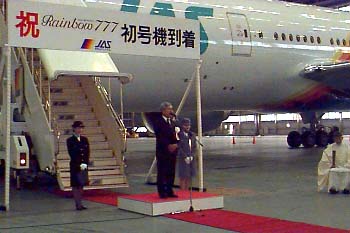



[ Economic | Marketing | Competition | International | Political ]
Although political aspects have little to do with an airplane's technical design, they can have a significant impact on the production and marketing process. In the case of the Boeing 777, many international suppliers are required not only to meet cost and technical targets, but also to foster international goodwill and balance of trade. As the United States' largest exporter, generating well over 50 percent of its commercial sales from foreign carriers, Boeing has a vested interest in international trade relations. Tactics Boeing has used to foster this is offsetting, which can be influential in gaining approval for the sale of aircraft to carriers in nations where government approval is needed before money can be transferred out of the nation. International politics also plays a role in marketing. This is easily seen in China's choice of Airbus versus Boeing jetliners depending at times, more of the currently relationship between the United States and China then on the technical merits of the aircraft. Boeing has thus engaged on a massive lobbying campaign to promote the granting of permanent Most Favored Nation Status to China. The influence of politics on sales to Chinese carriers is easily seen in China's ordering of Airbus jets coinciding with visits from France's Chirac while Boeing's 777s were ordered when US Vice President Gore visited China.
Other influences on the 777's design and manufacturing process are the religious and cultural beliefs held by foreign suppliers and carriers. For example, in order to please its Japanese suppliers and airlines, Boeing hired Shinto priests to exorcise malicious spirits from its Everett assembly facility before beginning operations.

Delivery Handover Ceremony for Japan Air System's First 777
(Priest in White Attire at Right)
![]()
![]()